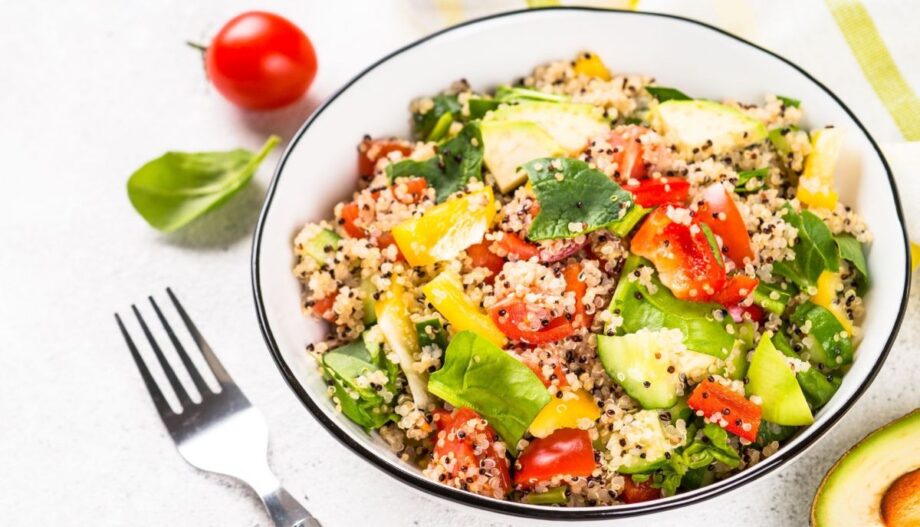Thanks for following our weekly series. In this third installment, we take a look at the Mediterranean Quinoa Salad. This Mediterranean-style salad was created as a way to use quinoa, which became popular globally as a “superfood” in the last few decades.
The Mediterranean Quinoa Salad: A Modern Classic for Healthy Aging
The Mediterranean Quinoa Salad is an excellent addition to any senior’s diet, aligning with the highly beneficial Mediterranean diet and offering a wealth of nutrients in one delicious dish. This salad is not an ancient recipe but a modern fusion that combines the ancient Andean grain, quinoa, with classic Mediterranean flavors like tomatoes, olives, and feta. Because of its nutrient density and ease of consumption, this salad is highly beneficial for older adults, provided simple modifications are made to manage sodium intake.
Core Ingredients: A Nutritional Breakdown
The core ingredients in the Mediterranean quinoa salad offer a robust nutritional profile. It is a nutrient-dense meal that supports healthy aging and can be a delicious and beneficial addition to a senior’s diet.
- Quinoa: This ancient grain is a complete, gluten-free protein source, making it excellent for muscle maintenance. It also provides substantial fiber, magnesium, and iron.
- Cherry Tomatoes (Halved): These are low in calories and high in hydration. They are an excellent source of Vitamins A and C, and a rich source of the antioxidant lycopene, which supports heart and immune health.
- Bell Peppers: Especially red bell peppers, they are a powerful source of Vitamin C (often more than an orange) and beta-carotene, which the body converts to Vitamin A.
- Cucumbers: Primarily water, cucumbers provide hydration and a crisp texture. They also contribute a small amount of Vitamin K and potassium.
- Olives: They provide healthy monounsaturated fats and Vitamin E, which are heart-healthy and have anti-inflammatory properties. However, they are a key source of the salad’s sodium content.
- Feta Cheese: Feta adds a savory, tangy flavor and is a good source of calcium for bone health and protein. Like olives, it is high in sodium, so portion control is recommended.
Summary of Core Ingredients: This Mediterranean Quinoa Salad is built on a foundation of fiber-rich quinoa, hydrating vegetables, heart-healthy fats from olives, and bone-building calcium from feta. It offers a wide spectrum of vitamins and minerals essential for senior health.
The Health Benefits: Why This Salad is a Senior Superfood
The core ingredients of the Mediterranean Quinoa Salad provide a robust nutritional profile that actively supports numerous aspects of healthy aging. The alignment of this meal with the well-regarded Mediterranean diet provides substantial evidence for its role in reducing chronic disease risks.
- Cardiovascular Health: The diet is famous for reducing the risk of heart disease and stroke. Healthy monounsaturated fats from olives (and a likely olive oil-based dressing) help lower “bad” (LDL) cholesterol and support healthy blood pressure. Fiber and antioxidants from the plant ingredients also protect blood vessels and reduce oxidative stress and inflammation.
- Cognitive Function: Adherence to the Mediterranean diet is associated with better brain health, slower cognitive decline, and a reduced risk of dementia and Alzheimer’s disease. The healthy fats and antioxidants help protect brain cells from damage.
- Muscle and Bone Maintenance: Quinoa is a complete protein, meaning it contains all nine essential amino acids. Adequate protein intake is vital for seniors to maintain muscle mass, strength, and overall function, which helps prevent sarcopenia and frailty. Feta contributes calcium, while quinoa provides magnesium and phosphorus, all of which are crucial for maintaining strong bones and potentially preventing osteoporosis.
- Digestive Health and Hydration: The rich fiber content in quinoa, bell peppers, and cucumbers promotes regular bowel movements, preventing constipation (a common issue for older adults) and supporting a healthy gut microbiome. High-water-content ingredients like cucumbers and tomatoes also help seniors stay hydrated.
- Blood Sugar Management: The combination of protein, fiber, and complex carbohydrates in the salad has a low glycemic index, which helps stabilize blood sugar levels. This is particularly beneficial for seniors with diabetes or pre-diabetes.
Summary of Key Benefits: From protecting the heart and brain to maintaining muscle and bone strength, the Mediterranean Quinoa Salad is a nutrient-dense, balanced, and delicious meal that promotes overall healthy aging. The combination of complete protein from quinoa and the disease-fighting compounds from the vegetables makes it a standout choice.
Potential Risks and Simple Management Strategies
While the Mediterranean quinoa salad is overwhelmingly healthy, there are a few potential health risks and considerations for seniors. These are primarily related to sodium intake, potential choking hazards, and specific dietary sensitivities or medical conditions. These risks can be effectively managed through simple preparation adjustments.
Sodium Management is Crucial
The main potential risk comes from ingredients that are naturally high in sodium, such as olives and feta cheese. A high-sodium diet is a significant risk factor for seniors, as they are often more salt-sensitive and have a higher prevalence of high blood pressure (hypertension), which can lead to stroke, heart attack, and kidney disease.
- Management: To control sodium, use low-sodium or reduced-salt versions of olives and feta cheese. It is also important to limit the portion sizes of these ingredients and avoid adding extra table salt, relying instead on herbs, lemon juice, and other spices for flavor.
Choking and Chewing Hazards
Seniors may have dental issues or difficulty with swallowing (dysphagia). Harder raw vegetables (like crisp bell peppers or cucumbers) and the small, firm shape of whole olives or cherry tomatoes could present a choking hazard if not prepared correctly.
- Management: Ensure all ingredients are chopped into small, manageable, bite-sized pieces. Halving the cherry tomatoes and slicing the olives and cucumbers is recommended to mitigate this risk.
Considerations for Kidney Health
For seniors with pre-existing chronic kidney disease (CKD), the mineral content of some ingredients might be a concern. Quinoa is a good source of potassium and phosphorus. While healthy for most people, those with impaired kidney function may need to monitor their intake of these minerals, as their kidneys may struggle to filter excess amounts. Additionally, quinoa is relatively high in oxalates, which can contribute to the formation of kidney stones in susceptible individuals.
- Management: Seniors with kidney disease should consult their doctor or a registered dietitian to determine appropriate portion sizes. Rinsing quinoa thoroughly before cooking can help reduce its oxalate content.
Food Allergies and Sensitivities
Though less common, individual sensitivities can occur. Some people are sensitive to compounds in quinoa called saponins, which can cause stomach upset, bloating, or other digestive problems.
- Management: Rinsing the quinoa thoroughly before cooking helps remove the saponin coating. If an allergy is present, the individual should avoid the ingredient entirely.
Summary of Risks and Management: The core potential risks are easily managed through preparation. By strictly controlling the sodium in the feta and olives and ensuring all ingredients are chopped into small, safe pieces, you maintain all the health benefits while mitigating the primary concerns.
Tips to Make It a Healthier Option for Seniors
To make the Mediterranean Quinoa Salad an even healthier and safer option for seniors, the focus should be on managing sodium, ensuring safe preparation, and maximizing nutrient absorption. These simple steps ensure you get all the delicious benefits without the risks.
- Strictly Manage Sodium and Select Ingredients: Controlling sodium is the most crucial adjustment. Opt for low-sodium or reduced-salt feta cheese and olives, and always rinse olives under water to remove excess brine. Instead of relying on salt for flavor, use a generous mix of fresh or dried herbs (like oregano, basil, and dill) and a squeeze of lemon juice.
- Prioritize Safe Preparation (Choking Prevention): Ensure the food is easy to chew and swallow. This means you must chop all ingredients finely and uniformly into small, bite-sized pieces. Slicing olives in half or quarters is essential. Also, make sure the quinoa is cooked to a soft, fluffy texture, as this aids in digestion and makes it easier to eat.
- Use Smart Dressing and Boost Protein: The dressing provides healthy fats necessary for absorbing vitamins A, D, E, and K. Always use Extra Virgin Olive Oil (EVOO) as the primary base for a simple vinaigrette (with lemon juice or red wine vinegar) and avoid creamy or bottled dressings. Finally, enhance the muscle-maintenance benefit by adding a lean protein source like thoroughly rinsed canned chickpeas, grilled chicken breast, or low-sodium canned tuna or salmon.
Summary of Tips: By focusing on low-sodium ingredient choices, precise chopping for safe consumption, and using a simple EVOO-based dressing, you transform the Mediterranean Quinoa Salad into a perfectly tailored and delicious meal for healthy senior living.
The Mediterranean Quinoa Salad is a perfect example of how modern fusion recipes can deliver superior nutrition for healthy aging. It serves as a nutritional powerhouse, actively supporting muscle maintenance, cognitive function, and bone health with its complete protein and rich vitamins. By following the simple modifications—especially strict sodium management —seniors can confidently enjoy this vibrant and versatile meal. It truly embodies the philosophy of nourishing yourself “On Our Way To 100.”
Hope you found our deep dive into the Mediterranean Quinoa Salad helpful! Join us on Facebook or Instagram and post a comment to let us know your favorite way to prepare quinoa. In the meantime, if you want to supplement your diet with the vitamins and minerals that support this lifestyle, please shop our selection.

